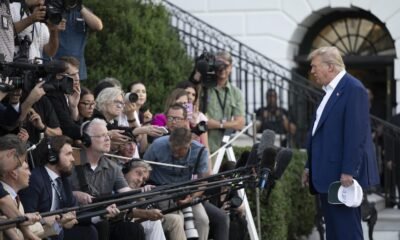Business
Deceptive Political Ads Flourish on Facebook & Instagram Amid Meta’s Vulnerabilities Ahead of Election

This story was originally published by ProPublica.
A recent investigation has revealed a troubling trend involving deceptive ads exploiting high-profile public figures. In December, the verified Facebook page of Adam Klotz, a Fox News meteorologist, became the center of this controversy as it began running bizarre video advertisements promising easy cash to viewers.
Some ads featured former President Donald Trump, claiming, “There’s $6,400 with your name on it, no payback required,” while others used President Joe Biden’s voice to assure audiences that “this isn’t a loan with strings attached.” Neither claim was genuine. These ads, generated by AI, directed users to fill out personal information forms, which were then sold to telemarketers targeting them with various offers, including scams.
Klotz’s page reportedly ran over 300 misleading ads before ProPublica contacted him in late August. Through a spokesperson, Klotz stated he was unaware of the ads, claiming his account had been hacked and he was locked out.
The ads stemmed from a vast network of deceptive marketing accounts known as Patriot Democracy, which has been active on Facebook for years. Holding control over approximately 340 pages, including Klotz’s, these networks have launched around 160,000 ads regarding elections and social issues in multiple languages. Meta Platforms, which owns Facebook, has struggled to contain this problematic advertising, despite its professed commitment to combating misleading content.
In total, these networks have spent more than $25 million on Facebook ads, making them some of the largest advertisers on the platform related to U.S. elections since 2018. This situation raises serious concerns about the efficacy of Meta’s safeguards against fraud and the ongoing proliferation of deceptive political ads, which have persisted since at least 2016.
Alarmingly, many users who engaged with these ads were unwittingly enrolled in monthly billing schemes or signed up for questionable insurance plans, risking their existing health coverage. Investigative analysis revealed that the advertisements often utilized tactics explicitly banned by Meta, such as deepfake audio imitating national leaders and misleading claims designed to trick viewers into disclosing their personal information.
Some ads even appropriated state seals to lend an air of legitimacy, such as one claiming that Illinois residents could obtain considerable funeral expense insurance. Others targeted consumers with divisive rhetoric, promoting unofficial merchandise and entangling users in subscription services without their consent.
Critics, including executives from the Integrity Institute, argue that these networks exploit loopholes within Facebook’s infrastructure. The intricate web of these marketing operations complicates enforcement actions for Meta. They highlight a systemic failure to address the root problems, allowing deceptive practices to repeatedly slip through the cracks.
In response to the growing concern, a Meta spokesperson asserted that the company invests heavily in safety and trust measures, enhancing its enforcement systems to identify and eliminate fraudulent activities. However, ProPublica’s findings reveal that Meta’s removal efforts have been inconsistent, with many offending ads seen by millions before any action was taken.
State officials have begun to intervene as deceptive advertising proliferates. Investigators from Alaska and California discovered ads misleadingly invoking state seals to falsely claim new state-sponsored benefits, eliciting consumer complaints regarding unauthorized marketing practices.
Moving forward, Meta faces significant scrutiny regarding its handling of deceptive advertising, as public trust further wanes. The investigation has underscored the urgent need for more stringent regulatory measures to safeguard users on social media platforms from ongoing fraud and manipulation.
As of now, Klotz remains locked out of his once-coveted page, still under control of the hackers who initially exploited it. “As far as I know, the account is still hacked,” he stated, illustrating the lingering ramifications of this widespread issue.

















